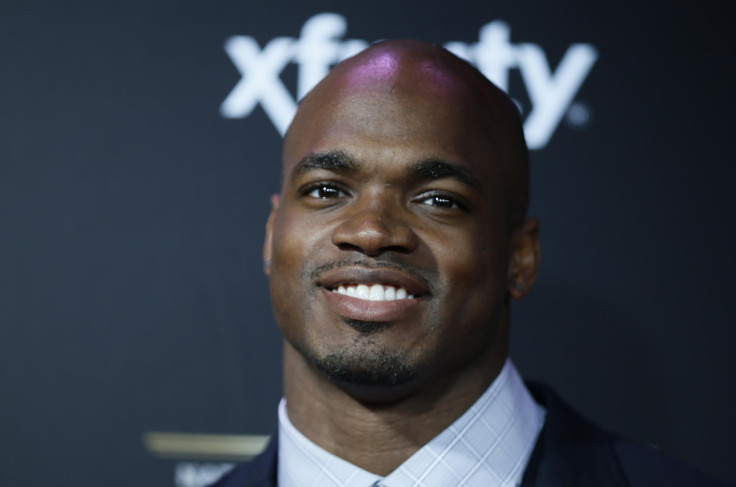Adrian Peterson Child Abuse Scandal: How Peterson Can Recover Amid Fallout, Sponsor Pressure

The Minnesota Vikings placed star player Adrian Peterson on the exempt/commissioner’s permission list Wednesday, reversing a previous decision to reinstate the beleaguered running back amid intense public pressure. As critics and sponsors continue to scrutinize Peterson's child abuse scandal, his ability to salvage both his playing career and his off-the-field business opportunities may depend on the extent to which he takes responsibility for his misdeeds.
“First move is always to get out in front of it,” said David Meltzer, CEO at Sports 1 Marketing and former chief executive at NFL player agent powerhouse Leigh Steinberg Sports & Entertainment. “[Peterson's] apology and that explanation that he gave should have been done earlier. You always want to get out in front of these things – take accountability and take responsibility. You noticed this even in the [MLB steroid scandal] – everyone who admitted their mistake was treated far less harshly than those who denied it and went to blame, shame and justification.”
In his first public comments since his Sept. 12 indictment for reckless or negligent injury to a child, Peterson said that he disciplined his child in the same way he was disciplined while growing up in Texas. Meanwhile, the Vikings temporarily reinstated Peterson Tuesday, citing his right to “due process.” Neither of these defenses played well with critics.
“Yes, Mr. Peterson is entitled to due process and should be ‘innocent until proven guilty,’” said Minnesota Gov. Mark Dayton, who condemned Peterson’s actions on Tuesday. “However, he is a public figure; and his actions, as described are a public embarrassment to the Vikings organization and the State of Minnesota. …Therefore, I believe the team should suspend Mr. Peterson, until the accusations of child abuse have been resolved by the criminal justice system.”
Radisson Hotels, whose limited sponsorship of the Vikings included a prominent place on the backdrop used for the team’s press conferences, expressed similar disappointment with Peterson’s initial reinstatement. The Minnesota-based company became the first major sponsor to suspend its support for the team.
Peterson's decision to blame his actions on ignorance fell short of the acceptance of full accountability that would have deflated criticism from hardline detractors, Meltzer said. “I think the mistake the agent made is that I would not have let Adrian go to the fact of, ‘this is how I was disciplined, so I think it’s okay.’ I thought that was a mistake. If I was abused as a child, that doesn’t make it okay to abuse my children,” he said. "… I thought they could have framed it different, that, ‘obviously, I have a problem because of the way I grew up,’ not defending yourself and saying, ‘I didn’t know any better.’”
The 29-year-old did not personally address his legal trouble until Monday, which allowed critics to dissect his alleged wrongdoing for a full weekend without any sort of response. Without an immediate statement, Peterson's representatives missed a chance to control the manner in which the public perceived the story, Meltzer said.
“You had the football weekend where everyone’s focused on football and he’s the talk of the weekend," he said. "You could’ve gotten out in front of it and people could have been coming out in his defense.”
Widespread outrage over Peterson’s actions, coupled with the Vikings’ botched handling of the situation, led several endorsers to cut ties with the former NFL MVP this week. Castrol, a BP (NYSE:BP) affiliate and one of Peterson’s biggest sponsors, announced Tuesday that it would end its business relationship with the Vikings star.
Nike (NYSE:NKE), Peterson’s other major sponsor, has yet to announce a formal end to their dealings. However, the company appears to be backing away from its partnership with Peterson – Twins Cities Nike stores have removed his jersey from their shelves. In a similar move, Wheaties removed Peterson’s profile and likeness from its website.
Though the adverse effects of pulled or suspended endorsements are apparent, Peterson’s troubles aren’t necessarily a death knell, Meltzer said. “I think you should be in constant communication with your sponsors and help facilitate communicating effectively to them the situation. Let them know, look, I understand that I have a morality clause, but I would appreciate your support. I’m taking accountability for this and when we weather this storm, you’ll have my support as well.”
Aside from immediate damage control, Peterson’s camp can also rely on the natural news cycle to gradually erode a sponsor’s need to take public action against him. As revealed by the NFL’s handling of scandals related to concussions and the continued use of the Washington Redskins name, public attention often lasts only as long as the latest outrage-provoking story. Moreover, a company’s willingness to scrutinize the viability of a sponsorship extends only insofar as a scandal has the ability to affect that company’s bottom line.
“This is a business – that’s the only higher source of morality and integrity that you care about, the earnings and the TV and the sponsorships,” Meltzer said. “Our morality now is only heightened and given when the economics make sense.”
© Copyright IBTimes 2024. All rights reserved.






















